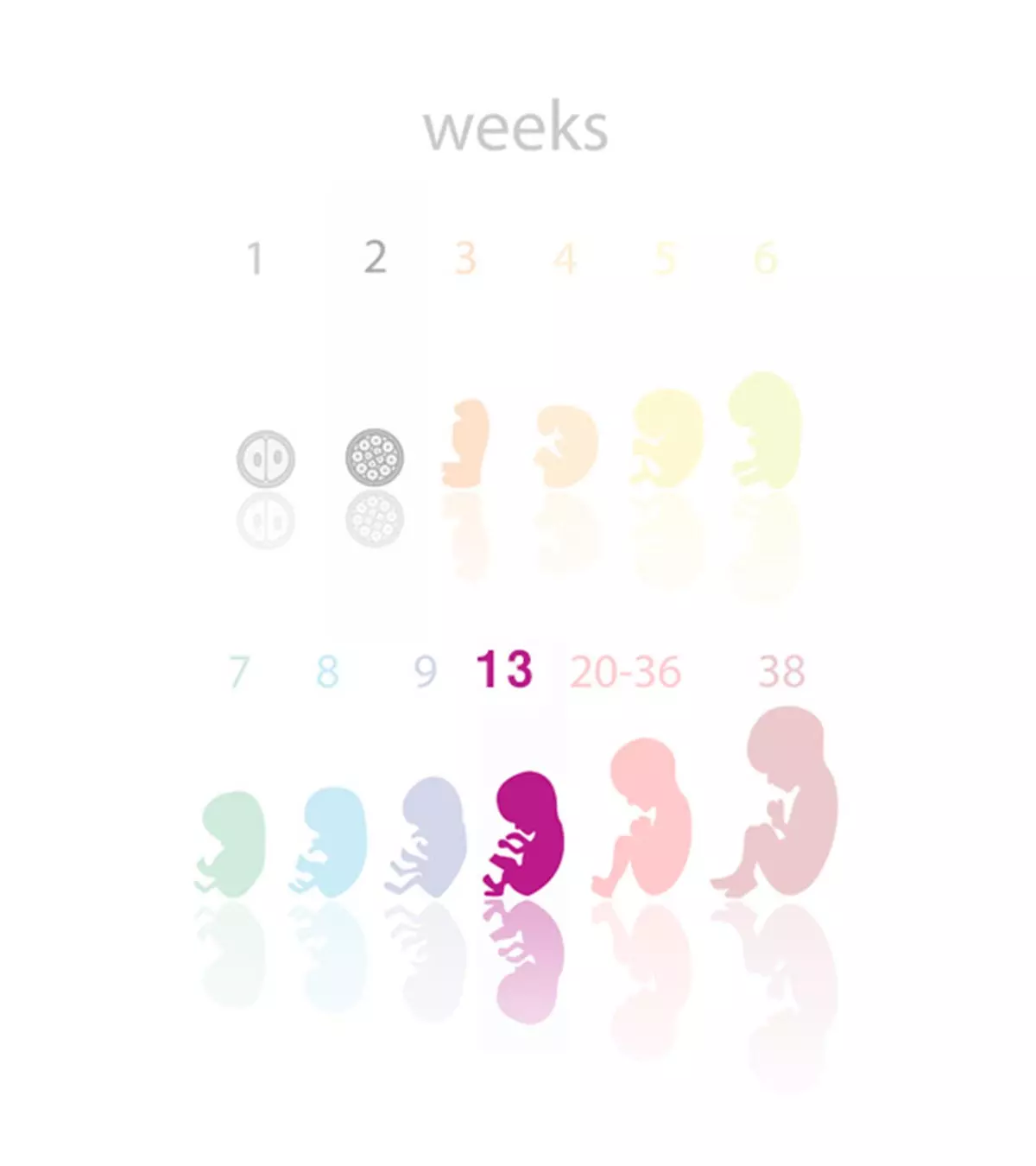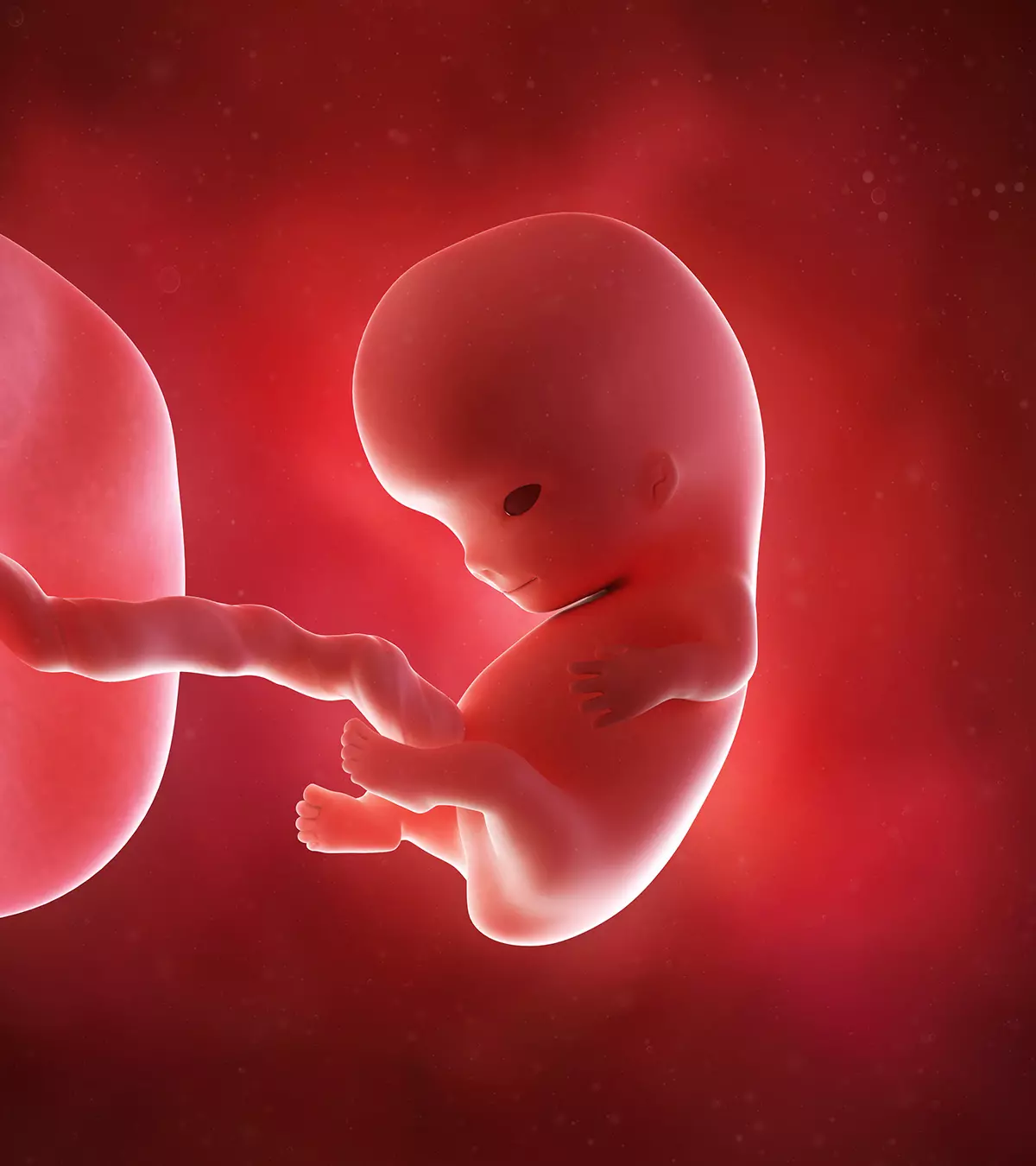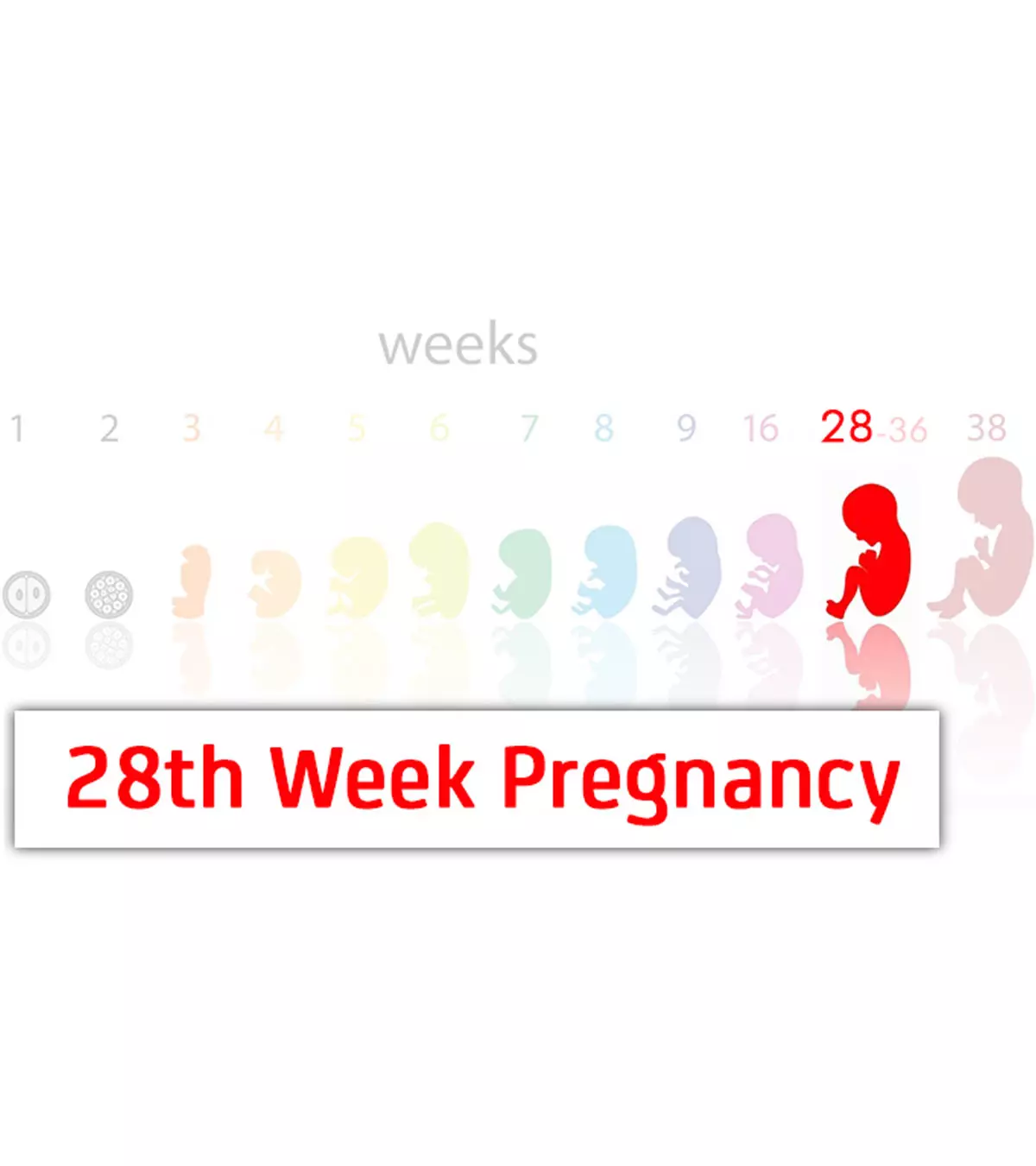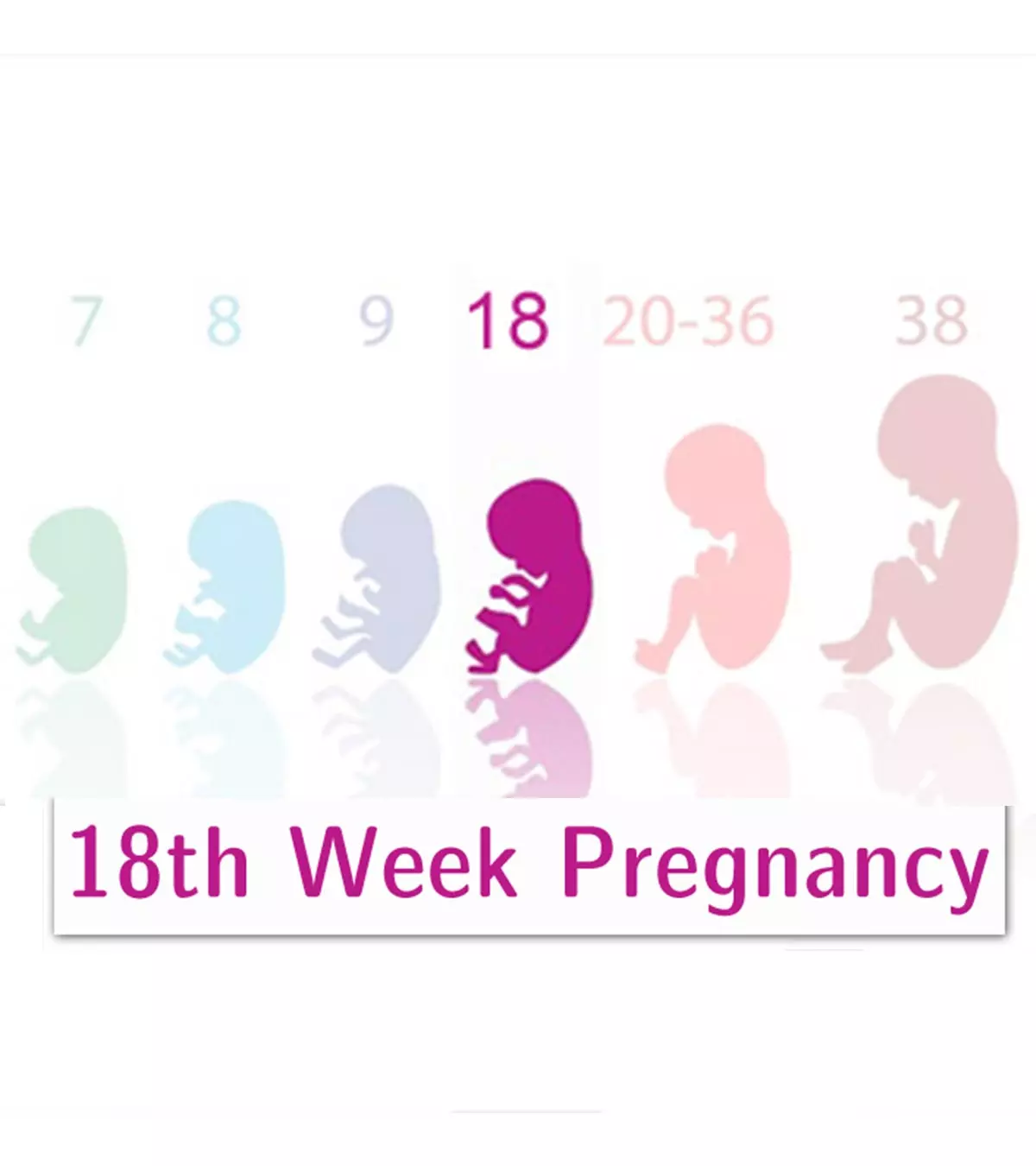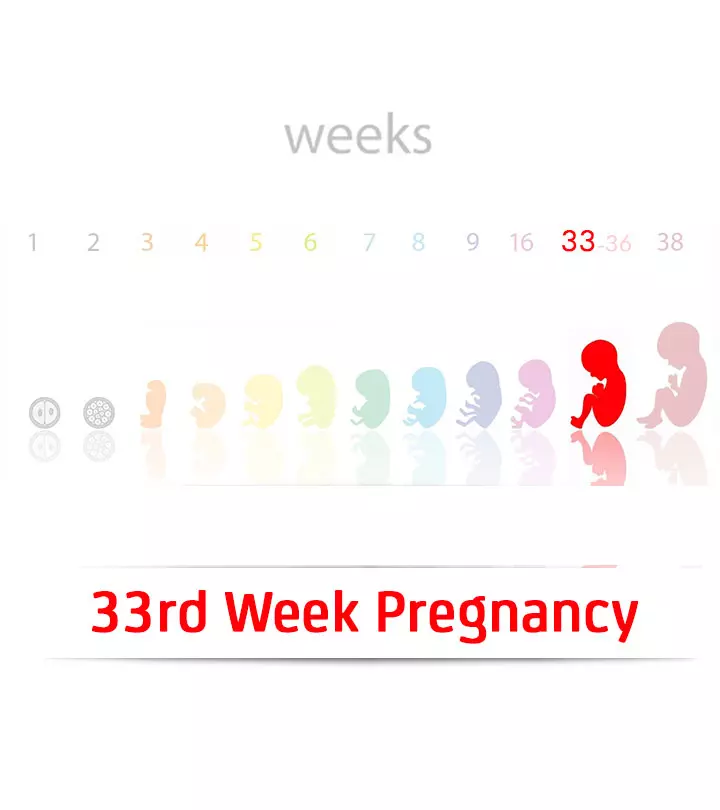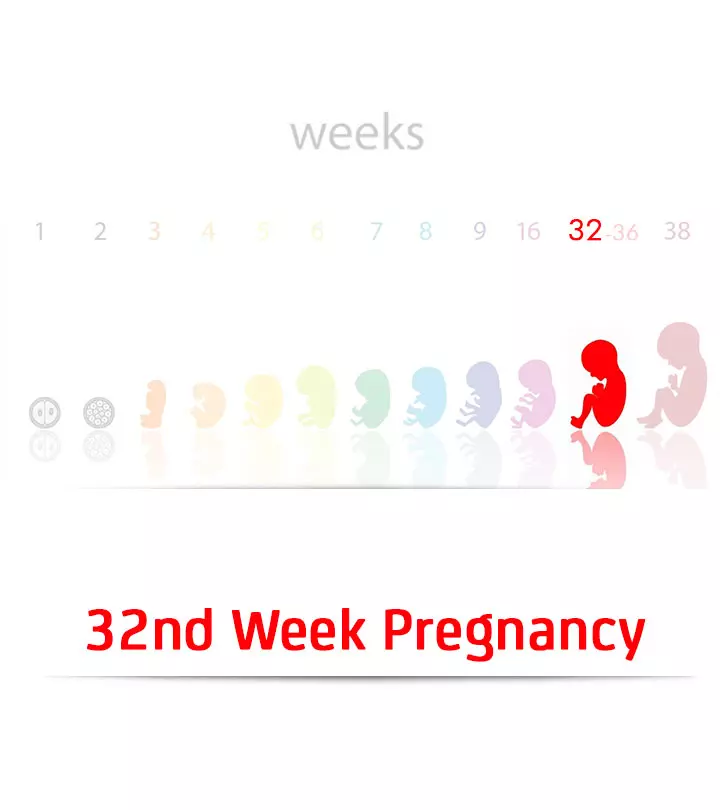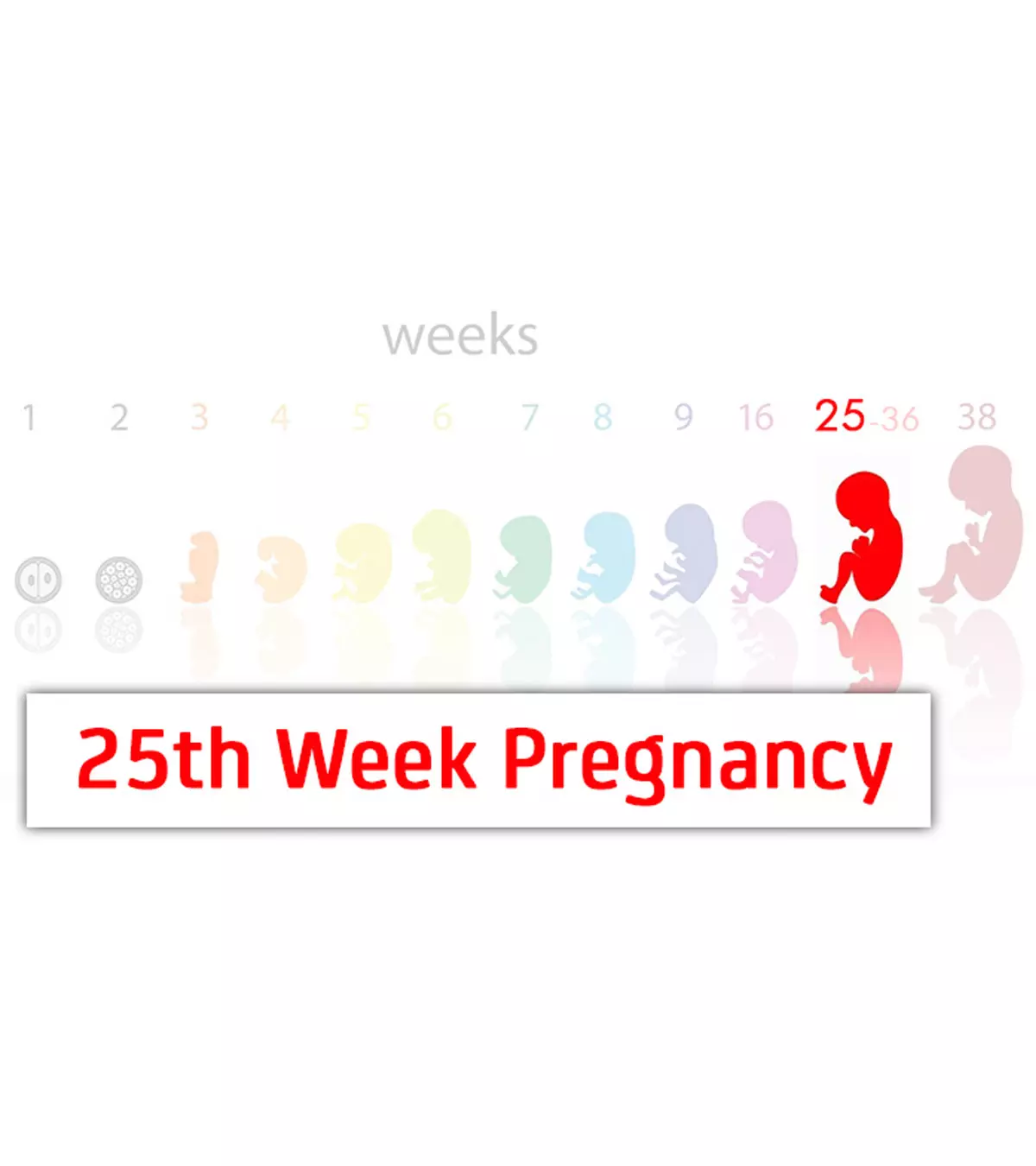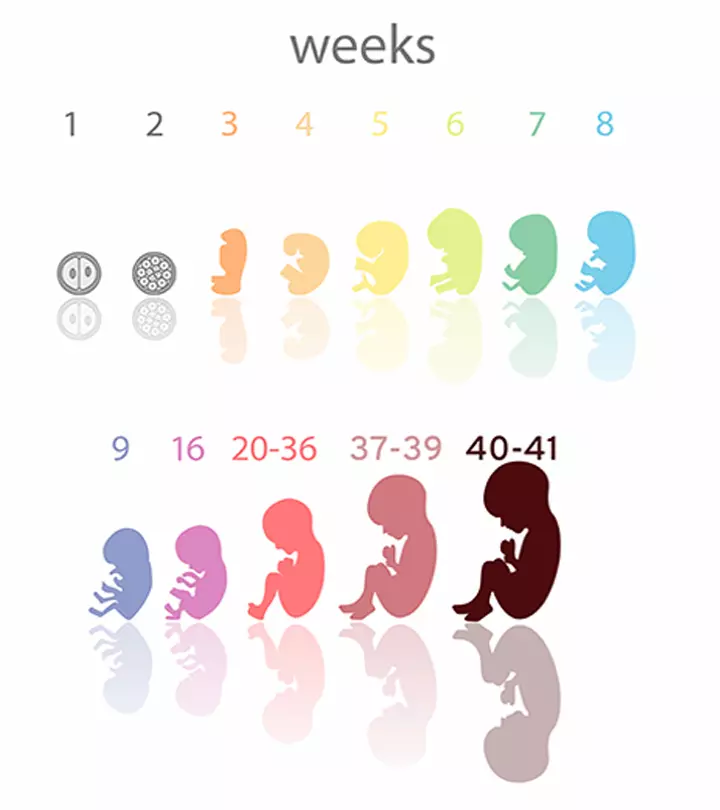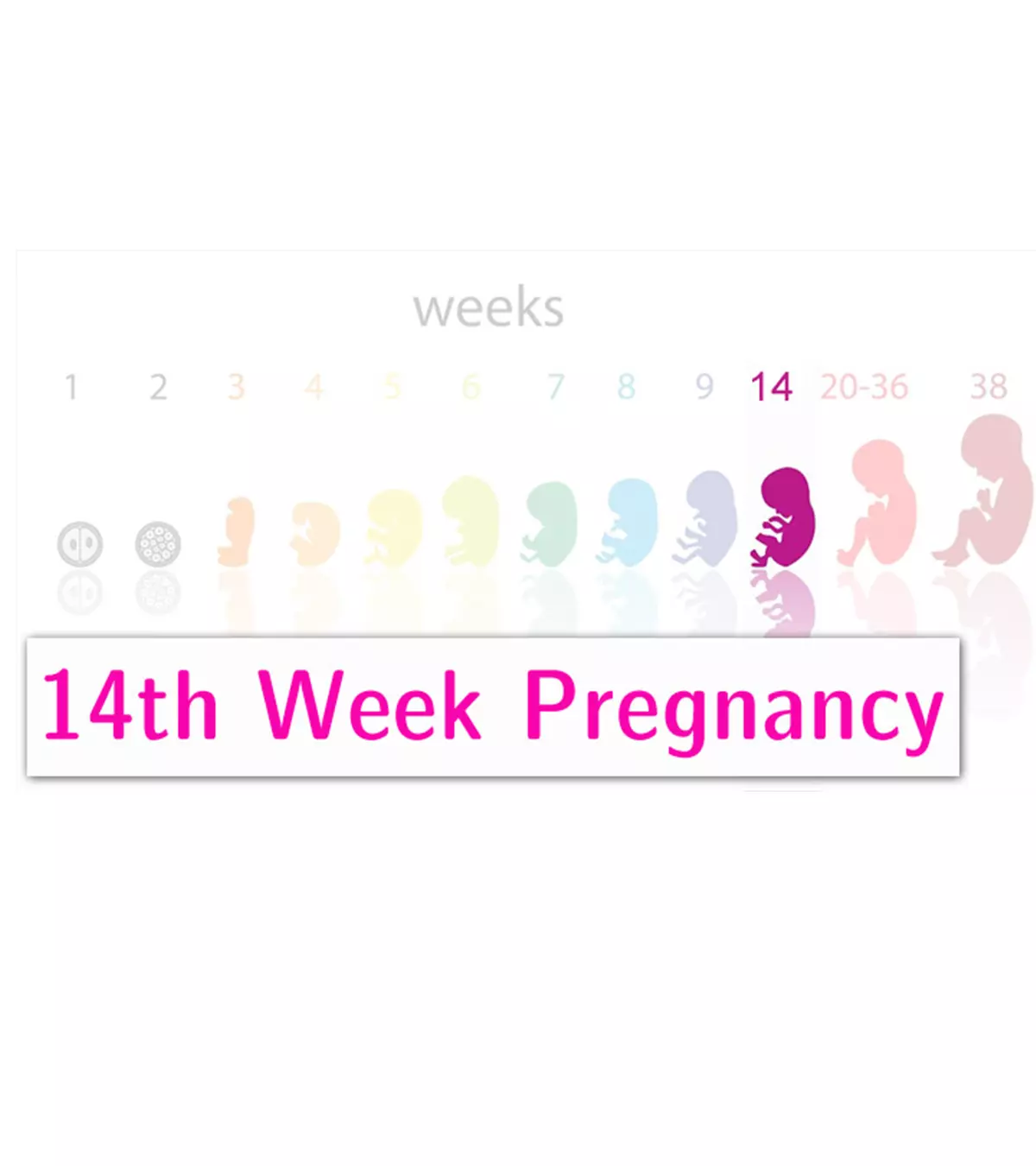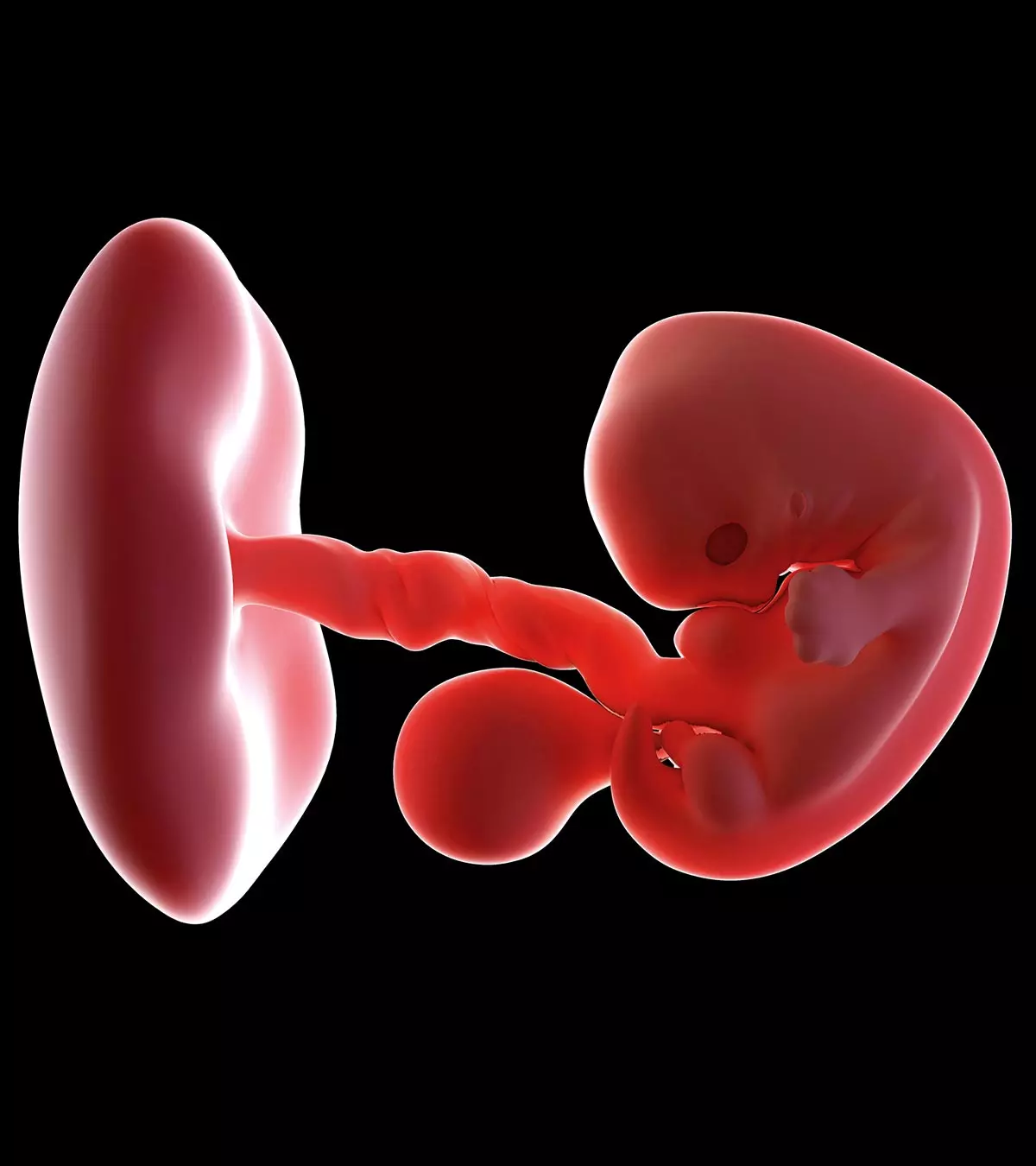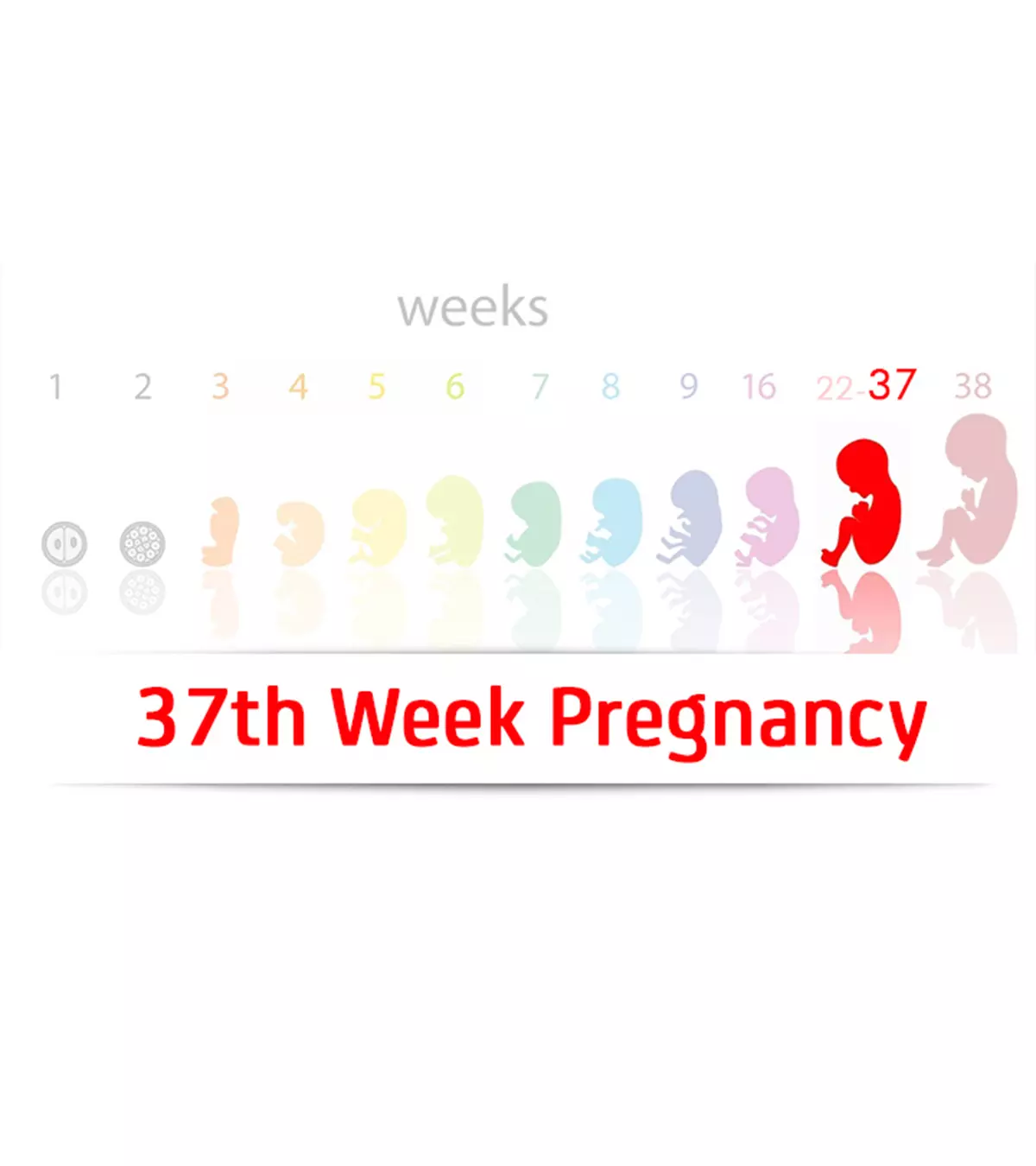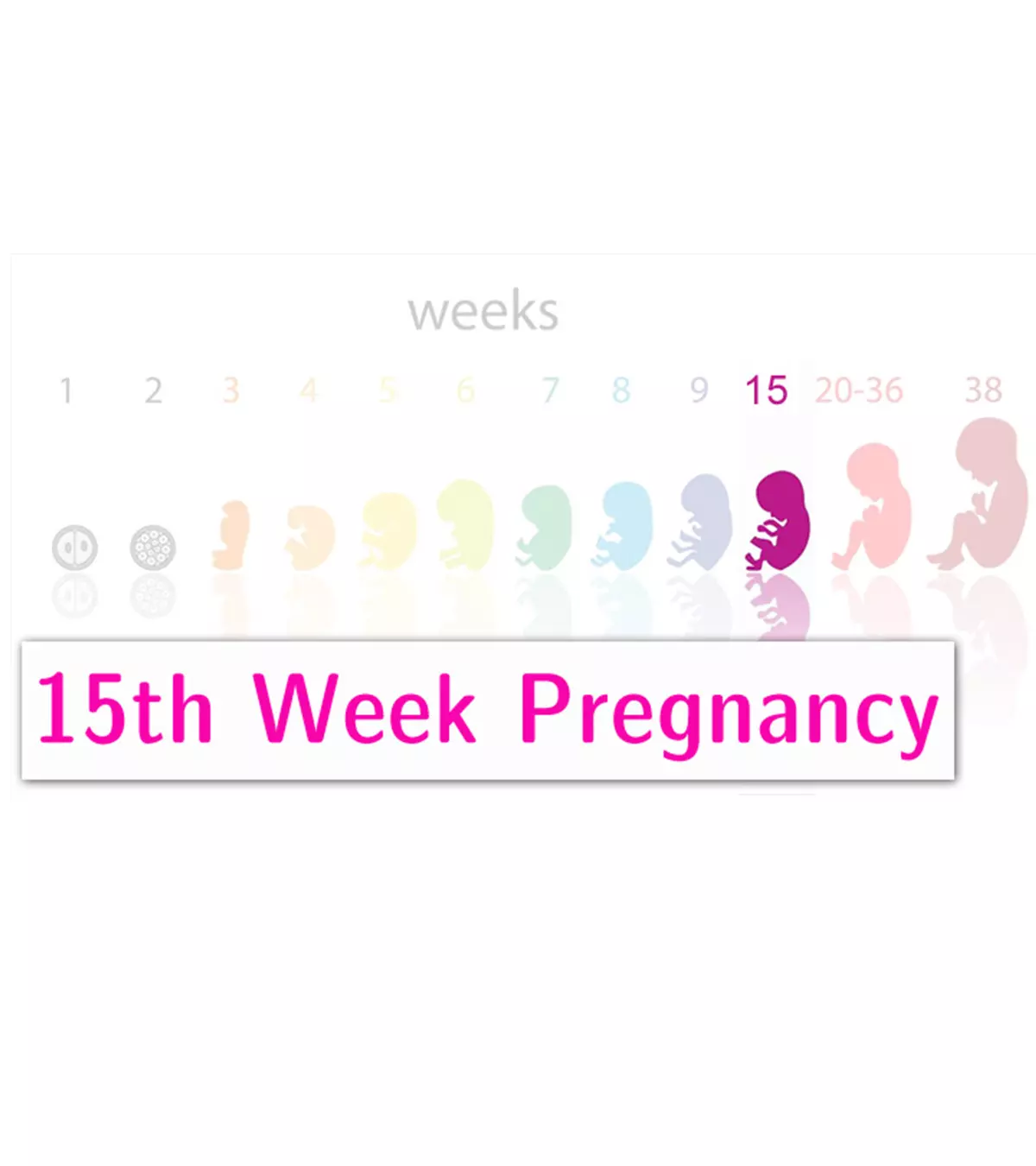
Image: Shutterstock

Key Pointers
- At 15 weeks, the baby is 10.1cm long and weighs 2.47 ounces, and its organs are formed and rapidly developing.
- Pregnant women may experience weight gain, reduced morning sickness, and dizziness due to increased pressure on blood vessels.
- Symptoms experienced by expecting mothers at 15 weeks include insomnia,frequent urination, constipation, shortness of breath, heartburn, mood swings, and anxiety.
- It is important to undergo second-trimester screening and genetic anomaly tests at this stage.
- A well-balanced diet, plenty of fluids, appropriate exercise, and supplements can help maintain a healthy pregnancy.
How Many Months Are 15 Weeks Pregnant?
At 15 weeks of gestational age, you are three-and-a-half-months pregnant. You are in the second trimester by this week and may start to feel less nauseated in the mornings.
Keep reading to learn what is going on with your baby, the symptoms to expect, and how to take care of yourself this week.
How Big Is Your Baby At 15 Weeks?
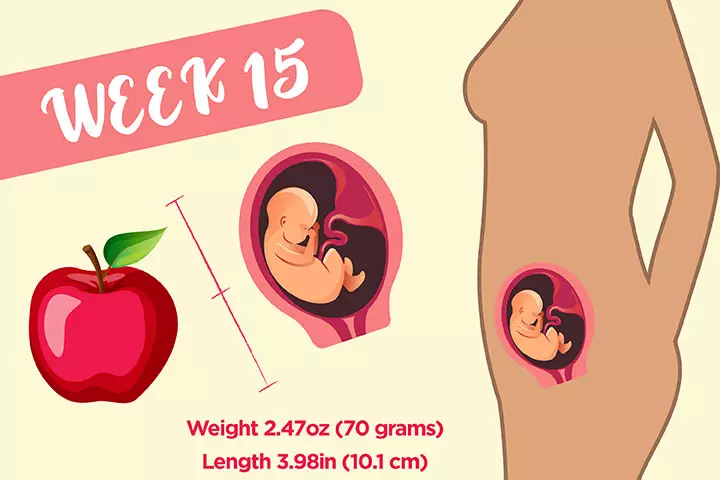
At 15 weeks, the baby is as big as an apple (1). They measure 3.98in (10.1cm) in length and weigh 2.47oz (70g) (2).
Next, we tell you about fetal anatomy and how the baby’s organs are growing.
The Baby’s Development This Week
In the 15th week, your baby’s organs are changing as follows.
| Body parts | Development |
|---|---|
| Eyes | Closed and sensitive to light (3) |
| Skin | Transparent and blood vessels are visible through it (4) |
| Ears | Attaining the position |
| Muscles | Developing |
| Hair | Eyebrows and hair on the head continue to grow |
| Tooth buds | Developing (5) |
| Bones | The skeletal system is developing |
| Limbs | Legs are getting longer; the baby may test the limbs by moving and fidgeting (6) |
At this stage, your baby is growing bigger and developing important organs and senses. With the baby’s growth, you will also continue to experience certain physiological changes.
 Did you know?
Did you know?What Symptoms Of Pregnancy Do You Experience In The 15th Week?
The physiological changes you experience now include:
- Weight gain: the weight gain should be as per the BMI (7).
| BMI | Below 18.5 | 18.5 – 24.9 | 25 – 29.9 | 30 and above | |
|---|---|---|---|---|---|
| Weight gain | 28-40 pounds | 25-35 pounds | 15-25 pounds | 11-20 pounds | |
- Faintness or dizziness: The growing uterus puts more pressure on the blood vessels, reducing the blood flow to the brain and causing fatigue or lightheadedness. Sometimes staying hungry for a long time can also cause lightheadedness.
- Round ligament pain: The pain is either felt on one side of the abdomen or both sides, due to the stretching of the groin ligaments.
- Insomnia: Backaches, hip pain, and leg cramps make sleeping difficult. Using a pillow around the stomach and between the legs can offer some relief.
- Frequent urination: The uterus’ pressure on the bladder increases the frequency of urination.
- Constipation: The progesterone hormone relaxes the muscles of the digestive tract, causing the food to remain in the tract for longer than usual and resulting in constipation during pregnancy.
Joolia Gulia, a mom of four, shares on her blog, “All sorts of strange musical noises emerge from my gut and they sound like any of the following: screeching, popping, barking, clicking, and my personal favorite…..the Dumb and Dumber gurgle. Not only am I full of enough gas to implode a small house but I’m also constipated (i).”
- Swollen gums: The ligaments in the mouth are affected by the changes in the hormones. Pregnancy tumors or swelling between the teeth may appear due to plaque. If morning sickness is persistent, then an increase in mouth acids can cause tooth decay (8).
- Shortness of breath: The hormone fluctuations cause more blood flow to the mucous membranes that make them swell and soften, causing stuffy nose and congestion. It also causes breathlessness. Try not to blow it hard as it can cause a nose bleed during pregnancy.
- Heartburn and indigestion: As the digestive tract relaxes, the stomach acids are pushed towards the esophagus, resulting in heartburn and indigestion.
Genevieve Howland, a childbirth educator and a mother of three, tells how she dealt with acid reflux during pregnancy. She says, “I have been consuming my digestive enzymes and a glass of milk with each meal which really helps (ii).”

- Occasional headaches: Hormonal fluctuations or stress can lead to headaches. Meditation or yoga can help relieve stress.
- Varicose veins: The extra blood volume puts pressure on the blood vessels causing the veins in the legs to swell.
- Excessive salivation: Hormonal changes also cause excessive salivation. Also, the body produces excess saliva to neutralize the gastric acid produced due to gastroesophageal reflux.
- Your body starts to change externally, while your emotional state is also vulnerable.
Changes In The Body At 15 Weeks
Physical changes

- The pregnant belly or baby bump is usually not visible during this week. However, second-time moms may notice a slight increase in their belly size.
- There is an increase in the breast size, and the areola becomes darker. The blue veins around the breast area become prominent due to the increased blood flow.
- The linea nigra gets darker.
- The changes in hormonal levels make your hair look fuller, thicker, and shinier.
- Fetal movements and Fetal hiccups can be felt during the second trimester.
Emotional changes

- Strange dreams, as a result of pregnancy fears.
- Mood swings.
- Variation in sexual desire
- Anxiety
When To Call The Doctor?
If you have any of the following symptoms, then get in touch with the doctor (9):
- Fever (100.4 degrees or higher)
- Pelvic pain other than cramping
- Less urination or dark-colored urine
- Severe vomiting
- Shortness of breath
- Bleeding or discharge from vagina
If your pregnancy is going smooth and normal, then you can schedule a regular OB/GYN appointment.
Your OB/GYN Visit

If a prenatal care appointment is scheduled with the doctor this week, the following tests will be done:
- Weight check
- Blood pressure
- Fetal heart rate assessment
- Second-trimester screening (10): Ultrasound, blood tests, including the maternal serum screening test (MSS) done during the first trimester, are scheduled at this time. These tests are referred to as ‘multiple markers’ or ‘quad screen’ tests.
They are done to determine the level of four substances namely AFP, estriol, inhibin, and human chorionic gonadotropin in the blood to evaluate the risk of:
- Down syndrome
- Trisomy 18
- Neural-tube defects (NTDs) such as spina bifida in the fetus.
- Defects in the abdominal wall of the fetus
While this screening test is not 100% accurate, it can help determine the chances of having chromosomal abnormalities and refer to the next diagnosis.
- Amniocentesis (11): It is a diagnostic test carried at 15 to 20 weeks of pregnancy. This test is done if the results of the screening test are not normal. A small amount of the amniotic fluid taken from the womb is tested to check for any genetic abnormalities (like cystic fibrosis, sickle cell disease, and heart defects) and congenital disabilities (like neural tube defect or spina bifida).
Some tests may not be safe for you, so talk to your doctor before getting any diagnostic procedures done.
 Quick fact
Quick factWhen the going is good, you can make it better by following some tips.
Tips To Follow
Here are a few tips you can follow for a healthy pregnancy:
- Eat smaller meals at regular intervals.
- Drink a lot of water and keep yourself hydrated.
- Follow a healthy diet that includes meat, cereals, pulses, dairy products, fresh fruits, and vegetables. The right amount of calorie intake during the second trimester is 2,200 calories per day (12).
- Engage in light workouts to keep yourself active and healthy. A healthy diet and exercise can keep blood sugar levels in control, reducing the risk of gestational diabetes.
- Avoid consumption of caffeine and alcohol as it can affect the baby’s development.
- Rest properly and try to sleep on your left side.
- In the case of nausea, drink lemonade, eat watermelon or sniff a lemon.
- Avoid skipping meals or lying down immediately after having meals.
- Avoid uncooked, spicy, deep-fried, and fatty foods.
- Take prenatal vitamins and supplements (folic acid, vitamin B6) along with iron and calcium daily.
- Wear comfortable and breathable maternity clothes.
- Avoid wearing heels and switch to flats and slippers.
- At this point in time, the fetal hearing sense will begin to develop. Communicate with your baby, and they will likely perceive the sound of your voice.
- Avoid taking medicines without your doctor’s permission.
- Stay connected with family and friends.
- Enroll in a prenatal class to learn helpful tips and connect with other moms-to-be.
Pregnancy is a journey that a couple undertakes together. So, your partner also plays a vital role in supporting you through this phase of life.
Tips For Dad-to-be

Here is what your partner can do to support you during this phase of pregnancy:
- Accompany you to your prenatal appointments.
- Help you with the daily household chores.
- Go for daily walks with you.
- Plan for an outing to make you feel refreshed.
- Begin planning for welcoming your newborn.
- Go for maternity wear shopping.
Frequently Asked Questions
1. Where is my baby located at 15 weeks?
In the 15th week, your baby is surrounded by the amniotic fluid in the amniotic sac of the uterus (13). Your uterus is located four to five inches below your belly button.
2. Can I feel my baby move at 15 weeks?
Some women may feel their baby move in the 15th week, while others may not feel any movements until weeks 20 to 22. The baby’s movements depend on several factors and differ for each woman (14).
3. Can my baby feel me rubbing my belly at 15 weeks?
Babies cannot feel you rubbing their belly in the 15th week. They may start to feel this sensation in the 22nd week of pregnancy (15).
4. Can I feel my uterus stretching at 15 weeks?
During the 15th week, you may be able to feel the top of your uterus (16). You may also experience your uterus muscles tightening for a few minutes during the second trimester.
Although you may not be showing yet, the 15th week of pregnancy is as significant as the other weeks and stages of pregnancy. Some symptoms may begin to subside, while other symptoms, such as frequent urination, dizziness, and mood swings, may appear. The key to coping with the changes is staying calm and enjoying the passing weeks as you get closer to seeing your baby. Prioritizing maternal health and following a healthy diet and routine ensures adequate maternal nutrition, which is essential for healthy pregnancy progression. Moreover, attend all your doctor’s appointments since certain important tests to check your baby’s health and development are carried out during the 15th week of pregnancy.
Infographic: Checklist For Your 15 Weeks Pregnancy Checkup
Whether visiting your doctor or speaking to them over the phone, this infographic will help you ask your doctor about crucial points related to your 15-week pregnancy checkup. Illustration: Momjunction Design Team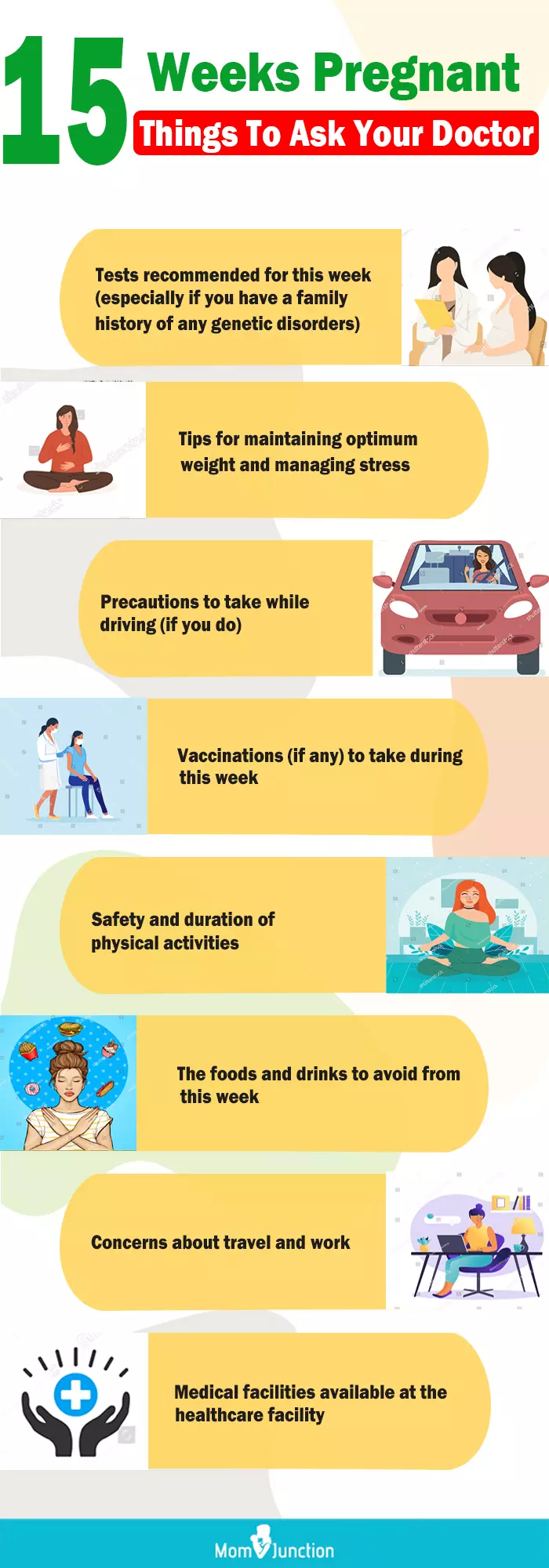
Illustration: Weeks Pregnant: Symptoms Baby Development And Tips
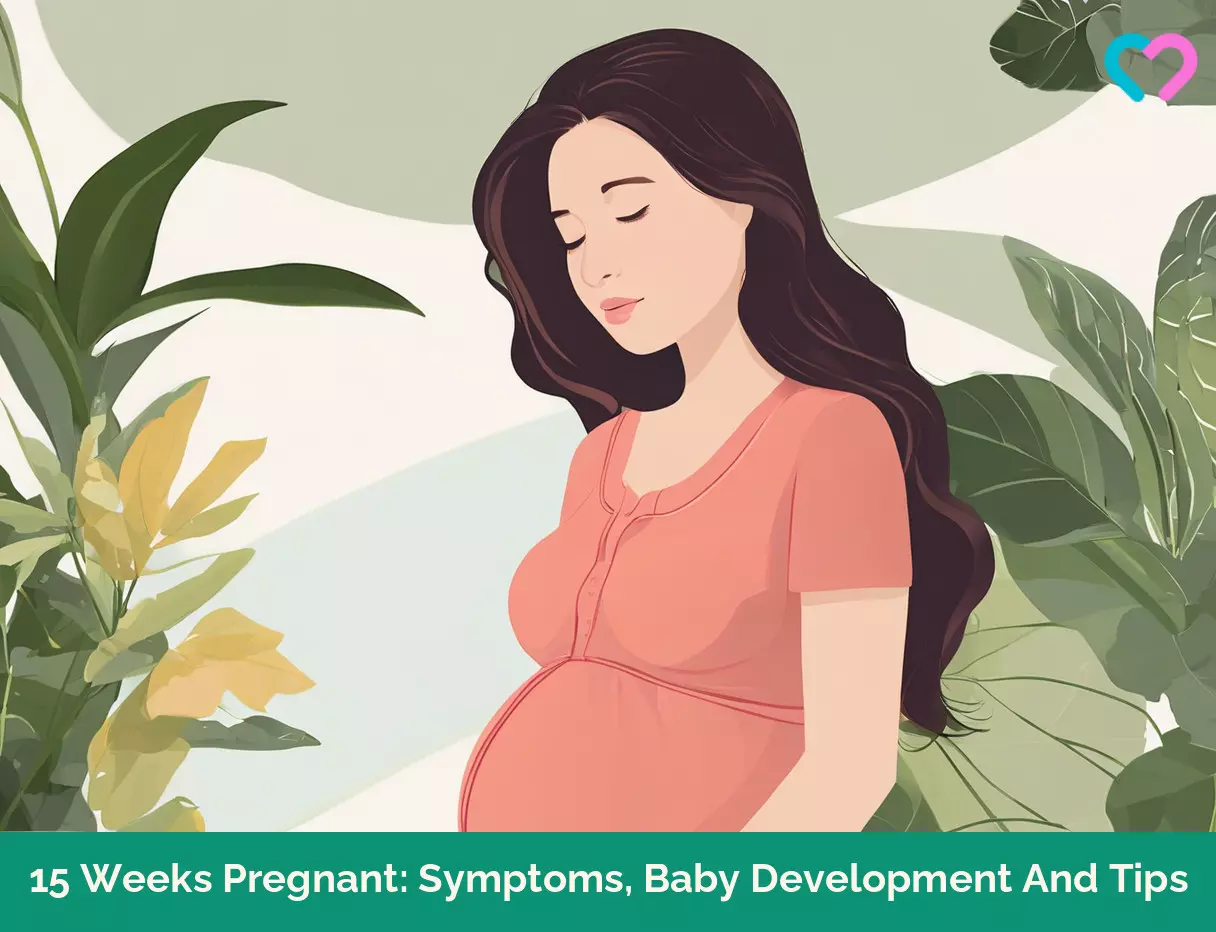
Image: Stable Diffusion/MomJunction Design Team
Learn about the exciting changes happening in your body and baby’s development during 15h week of pregnancy through this video.
Personal Experience: Source
MomJunction articles include first-hand experiences to provide you with better insights through real-life narratives. Here are the sources of personal accounts referenced in this article.
i. Fifteen weeks.https://julia-transition.blogspot.com/2009/09/fifteen-weeks.htmlii. My pregnancy @ 15 weeks + belly shot.
https://www.youtube.com/watch?v=Ql1OmTFrp7c
References
- Week-by-week guide to pregnancy.
https://www.nhs.uk/start-for-life/pregnancy/week-by-week-guide-to-pregnancy/2nd-trimester/week-15/ - Fetal Development.
https://embryology.med.unsw.edu.au/embryology/index.php/Fetal_Development - You and your baby at 15 weeks pregnant.
https://www.nhs.uk/pregnancy/week-by-week/13-to-27/15-weeks/ - Week 15.
https://kidshealth.org/en/parents/week15.html - Prenatal Summary.
https://www.ehd.org/prenatal-summary.php - 15 Weeks Pregnant: Baby’s Growing and You’re Showing.
https://www.healthywomen.org/content/article/15-weeks-pregnant-symptoms-and-signs - Weight Gain During Pregnancy.
https://babyyourbaby.org/pregnancy/during-pregnancy/weight-gain/ - Is It Safe To Go To the Dentist During Pregnancy?.
https://www.mouthhealthy.org/life-stages/pregnancy/pregnancy-dental-concerns - Warning signs during pregnancy.
https://www.pregnancybirthbaby.org.au/warning-signs-during-pregnancy - Common Tests During Pregnancy.
https://www.stanfordchildrens.org/en/topic/default?id=common-tests-during-pregnancy-85-P01241 - AMNIOCENTESIS.
https://www.marchofdimes.org/find-support/topics/planning-baby/amniocentesis - Eating right during pregnancy.
https://medlineplus.gov/ency/patientinstructions/000584.htm - 15 Weeks Pregnant.
https://www.nhs.uk/start-for-life/pregnancy/week-by-week-guide-to-pregnancy/2nd-trimester/week-15/ - Feeling your baby move during pregnancy.
https://utswmed.org/medblog/fetal-movements/#:~:text=Some%20women%20can%20feel%20their - Bonding with your baby during pregnancy.
https://www.pregnancybirthbaby.org.au/bonding-with-your-baby-during-pregnancy - Pregnancy week 15.
https://americanpregnancy.org/healthy-pregnancy/week-by-week/15-weeks-pregnant/
Community Experiences
Join the conversation and become a part of our nurturing community! Share your stories, experiences, and insights to connect with fellow parents.
Read full bio of Dr. Anita Gupta
Read full bio of Sakshi Mishra
Read full bio of Rebecca Malachi
Read full bio of Aneesha Amonz





